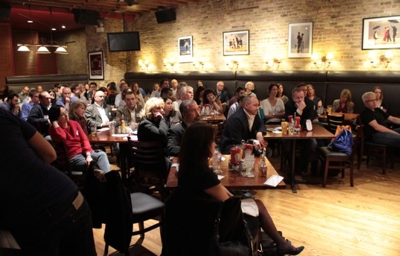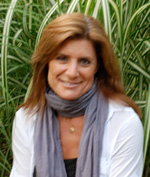Karen Weigert, the city of Chicago’s chief sustainability officer, was the main attraction at the Jefferson Tap & Grille in the West Loop on Tuesday night for a monthly “Green Drinks” gathering of local green-business entrepreneurs.
To sum up the two themes of the evening: gathering the data and recycling.
Ms. Weigert, who’s been in her new post since June and brings years of consulting and banking experience to the job, talked at length about the data that Mayor Rahm Emanuel’s office is now collecting so the administration can figure out the next steps to take in broadening the city’s sustainability efforts. The crowd of about 115 mostly wanted to know one thing: When is the city going to do a better job of recycling?
Ms. Weigert’s reply: “We’ll see what the data tells us.”
There’s even a chief data officer in the mayor’s office working on these matters, she noted wryly. “We kinda like data. The mayor likes data.”
The information-gathering under way includes a wide-scale mapping of energy use throughout the city to pinpoint problem areas, Ms. Weigert said. Another example is a managed competition program the mayor launched over the summer to explore the cost differences between private companies operating the city’s recycling efforts and city workers running the program in other areas. She said data will be collected over a six-month period, chewed on for another three, and then some decision about moving forward will come after that.
The monthly Green Drinks meet-ups, sponsored by Foresight Sustainable Business Alliance, combine networking opportunities for locals engaged in the green economy, along with a roster of guest speakers. The alliance is part of Foresight Design Initiative, a Chicago firm focusing on economic development, green business and related policy issues.
In a typical conversation-style setting for these meetings, Ms. Weigert carried on a spirited discussion with Peter Nicholson, Foresight’s executive director.
On the topic of recycling, Ms. Weigert conceded: “Chicago hasn’t answered it well enough yet, and we’ve got to get it right.”
To which Mr. Nicholson replied: “First we have to get it (recycling). And then get it right.”
She said the city is exploring setting up a grid system to fill in gaps missing in the current layout of the Blue Cart recycling program. Mr. Nicholson noted somewhat in jest that would work well considering the city already has a good street grid system in place.
Mr. Nicholson jokingly warned her the seemingly friendly crowd would turn on her during the question-and-answer period about the lack of widespread recycling in a city that is trying to gain a reputation as one of the greenest in the nation. When Ms. Weigert said Chicago plans to roll out recycling citywide, someone in the audience shouted: “When?”
Sure enough, some aspects of the city’s recycling shortcomings were brought up as people in the audience who raised their hands asked questions or offered remedies to improve the status quo.
Someone asked if the city would consider charging people to haul away their waste to encourage more recycling. Ms. Weigert noted that landfill costs are still relatively cheap in the Chicago area, which creates a different market dynamic than other parts of the country where it’s more expensive to dump garbage in landfills.
“It makes for difficult incentives here in Chicago, but by no means impossible,” she added.
Not surprisingly, one of the entrepreneurs in the audience offered his own company as a potential solution to some of the recycling challenges in the city. Steve Holland said he’s with a company called Free Green Can, which has been trying to give away free recycling kiosks to the city of Chicago for three years in exchange for sponsorship. He’s had success with the Park District, he said, but not so much with the city, even though they offered to pick up the recycling as well. He wanted to know how he could work with the city to finally make it happen.
Ms. Weigert replied that there are several companies trying to do similar programs. She pointed to another organization, which the city hired to put out solar trash compactors in the Loop, that offers recycling and is already moving in that direction.
Ms. Weigert focused on the positive gains the city is making in recycling and reminded the audience about a city initiative to reduce paper going into landfills and tougher city ordinances passed in recent years restricting the amount of construction and demolition debris that could be hauled to landfills.
In other matters, she touched on some of the mayor’s environmental and sustainability goals. Some of those efforts focus on improving energy efficiency and water conservation, and making it easier to get around the city on foot, with a bike, or with public transportation.
She also briefly described how the recent news about plans to dismantle the Department of Environment and shift programs to other departments is intended to encourage greater sustainability efforts within all areas and agencies of city government by “embedding it into all major decisions in different parts of the city.”
A couple of Chicago’s green-business entrepreneurs that night said they’ll have to wait for the data before deciding if this new strategy is good for the city’s future.





